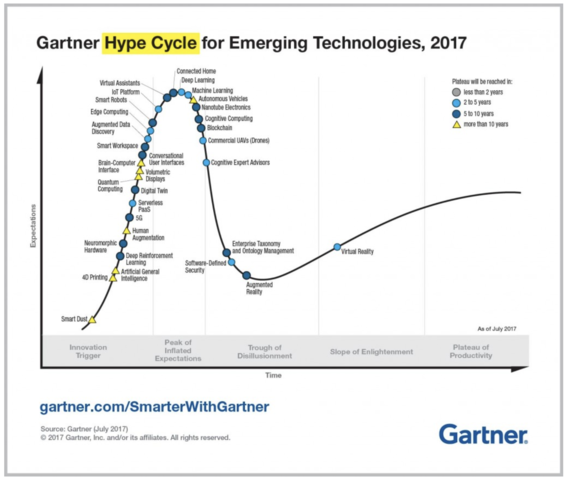The Emerging Business and Technology Forum (EBITS) was held during the REALTORS® Legislative Meetings & Trade Expo on May 17, 2018, at the Omni Shoreham in Washington, DC.
The theme “Robots and New Realities: Artificial Intelligence, Virtual and Augmented Reality and What They Mean for REALTORS®” focused on the implications of the technologies and how they will affect real estate practice as well as relationships with current and future clients. There was also an important update on General Data Protection Regulation (GDPR) compliance.
The forum was hosted by EBITS Chair Jorge Guerra and Vice-Chair Kyle Killebrew. The panelists included Aleksander Velkoski, data scientist, National Association of REALTORS®; Chad Curry, director, CRT Labs; Greg Cypes, chief technology officer, Contactually; Liz Sturrock, vice president information technology, National Association of REALTORS®; and, Mark Lesswing, chief technology officer, National Association of REALTORS®.
Below is an overview of the topics discussed:
Artificial Intelligence (AI)
Curry identified the top three challenges for AI as lack of skills, lack of strategy and inability to identify use cases. Other challenges noted were funding, privacy concerns, integration and valuation.
The Gartner Hype Cycle for Emerging Technologies was examined, highlighting the AI trend. The Garter Hype Cycle methodology provides a graphical representation of how a technology will evolve over time to determine how it is potentially relevant to real-world business application or will offer new opportunities. Presently, AI is in the Peak of Inflated Expectations stage, when the technology begins to be implemented, particularly by early adopters.

Virtual assistants are probably the most common and recognizable form of AI today. Earlier this month, Google unveiled Google Duplex, a bot dispatched through Google Assistant that is able to mimic natural conversation and complete simple real-world tasks like scheduling appointments. Curry believes this foray into artificial neural networks and deep learning is just the beginning of predictive, complex relationships which could encompass natural language processing, sentiment analysis, hyperlocal content curation, marketing automation and image-based property valuation and search.
Cypes pointed out that AI isn’t robots but is about augmenting technology today. For example, we are really bad at keeping up with people and staying in touch with each other. AI can help break the ice and help us understand when to reach out. However, Cypes stressed that technology is not there to replace humans – there still needs to be human interaction. He also said we must answer the questions “What is ‘good enough’ in predictive technology?” and “What is our fault tolerance?” The Zillow Zestimate presently is not good enough.
Cypes identified three ways AI will affect real estate:
- 3D printing of homes
- Property management through sensors
- Hyper-mobility of workforce
General Data Protection Regulation (GDPR)
GDPR is a regulation in European Union (EU) law concerning the data privacy and protection of all individuals within the EU and European Economic Area. Sturrock emphasized that it is important to note the key phrasing of “individual” rather than “citizen.” For example, this means if you have any information relating to an American expat presently in the EU, GDPR has extended jurisdiction to include you. Any information that can be traced back to an individual qualifies and includes website cookies, IP addresses or other tracing devices. The penalties are severe in that fines can be up to 4% of annual global turnover or $23.5 million, whichever is greater.
Sturrock identified special categories of personal data as follows:
- Racial or ethnic origin
- Political opinions
- Religious of philosophical beliefs
- Trade union memberships
- Genetic data
- Biometric data for the purpose of uniquely identifying a natural person
- Data concerning health
- Sex life and sexual orientation
GDPR goes into effect on May 25, 2018. While there are still questions about how the EU will enforce actions against U.S. entities, it is wise to make changes to your Web practices to protect yourself:
- Improve your security posture
- Perform a data inventory
- Update your website terms and conditions (and their approval)
- Off a form for disclosure and the “right to be forgotten”
- Build a notification plan
- Delete any data you don’t need
Blockchain
Many people think only about cryptocurrency when considering blockchains; however, it is so much more. While is it the foundation for cryptocurrencies, blockchain is actually coding that structures data in a digital ledger that can be shared across a network of computers without a central authority. Lesswing offered a real-world visualization of a blockchain. Your driver’s license contains relevant information such as your name, height, weight, address, etc. Therefore, your driver’s license is a database. Now, let’s say you get pulled over by a police officer. He uses your driver’s license to access your driving record, which will contain every driving infraction you have ever committed. Your driving record is a blockchain.
Lesswing has created a REALTOR association blockchain that is being used to track engagement of REALTORS, cross-association involvement, committees and contributions, and member movement. This blockchain, named BlockR, was created to allow sharing of member engagement information while ensuring accuracy and security. Piloted with six associations, 51 more associations have now asked to be included.
Blockchains can be useful in real estate by improving property records, reducing the cost of business for all parties, reducing the risk in real estate transactions and helping get to the closing table faster.
Moving forward with blockchain, the Real Estate Standards Organization (RESO) announced in April 2018 the creation of a workgroup that will catalog property “events” using existing RESO API and Data Dictionary standards. This will allow comparisons of similar properties across a spectrum of data including things like how the property was marketed and could influence best practices in real estate.





